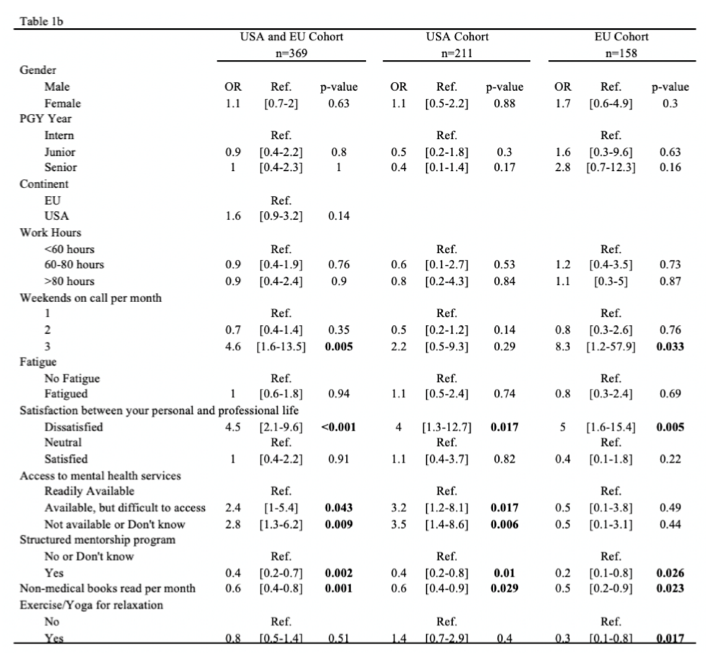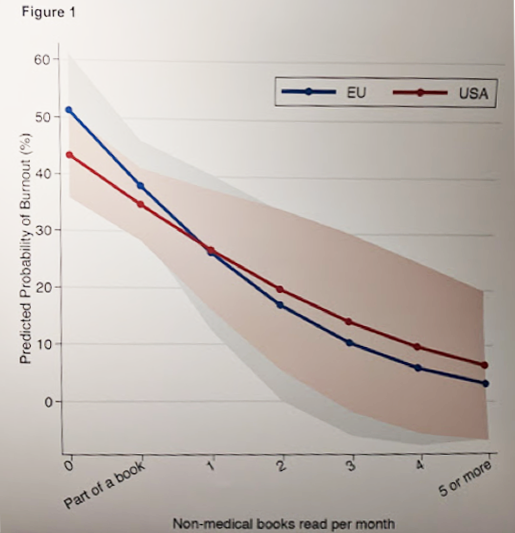In this survey study, the authors focused more on Urology trainees in the US and Europe and compared rates of burnout and predictors of burnout amongst the two groups. They conducted an anonymous survey study of burnout and its associations in urology trainees across the US and 4 EU countries using a 32-question questionnaire in April 2018. The survey included questions about demographics, personal and institutional factors, and several validated questionnaires. Burnout was assessed using the validated 2-item Maslach Burnout Inventory (MBI).
Response rates were variable by country and ranged from 9.3% to 45.2%: 20.9%-US, 45.2%-Italy, 12.5%-France, 30.5%-Portugal, and 9.3%-Belgium. While low, this is a known issue with survey-based studies. The total number of responses were *** Demographics of the cohort is below: ***.
Overall burnout rate was 37.9% in the US and 43.7% in the EU, so not much different. When looking at predictors of burnout, on univariate analysis, burnout in both cohorts was associated with increased weekends on call, the presence of fatigue, dissatisfaction with work-life balance (WLB) while reading for pleasure appeared protective against burnout (Table 1a below).

In the US cohort, access to mental health and structured mentorship were protective against burnout, and increased work hours were associated with burnout in only the US cohort (p <0.001, <0.001, and =0.014, respectively). In the EU, yoga and exercise were protective (p=0.036).
Taking this to a multivariate analysis, dissatisfaction with WLB was associated with increased burnout (OR 4.5, 95% CI 2.1-9.6, p<0.001) in both cohorts (Table 1b below). Reading non-medical books for relaxation (OR 0.6, 95% CI 0.4-0.8, p=0.001) and the existence to structured mentorship (OR 0.4, 95% CI 0.2-0.7, p=0.002) was protective of burnout. In the overall cohort, workout out and exercise, gender, PGY year, work hours and fatigue were not predictors of burnout.

An association of the amount of reading and burnout telling:

On subgroup analysis of each continent, a lack of access to mental health was associated with burnout in the US only (OR 3.5, 95% CI 1.4-8.6, p=0.006) while increased weekends on the call were associated with burnout in the EU only (OR 8.3, 95% CI 1.2-57.9, p=0.033).
Based on these very interesting results, it is clear that burnout is high amongst Urology trainees in the US and Europe – but due to different training programs and cultures (both in Urology and perhaps in society), the predictors of burnout are slightly different. These result may help training programs tailor their support systems accordingly to help trainees prevent burnout so early in their career.
Presented by: Daniel Marchalik, MD, is Director of Ambulatory Urologic Surgery and Director of Medical Education at MedStar Washington Hospital Center
***2. Petra Urology Group, Department of Urology, Milan, Italy
Written by: Thenappan Chandrasekar, MD (Clinical Instructor, Thomas Jefferson University) (twitter: @tchandra_uromd, @JEFFUrology) at the 34th European Association of Urology (EAU 2019) #EAU19 conference in Barcelona, Spain, March 15-19, 2019.


